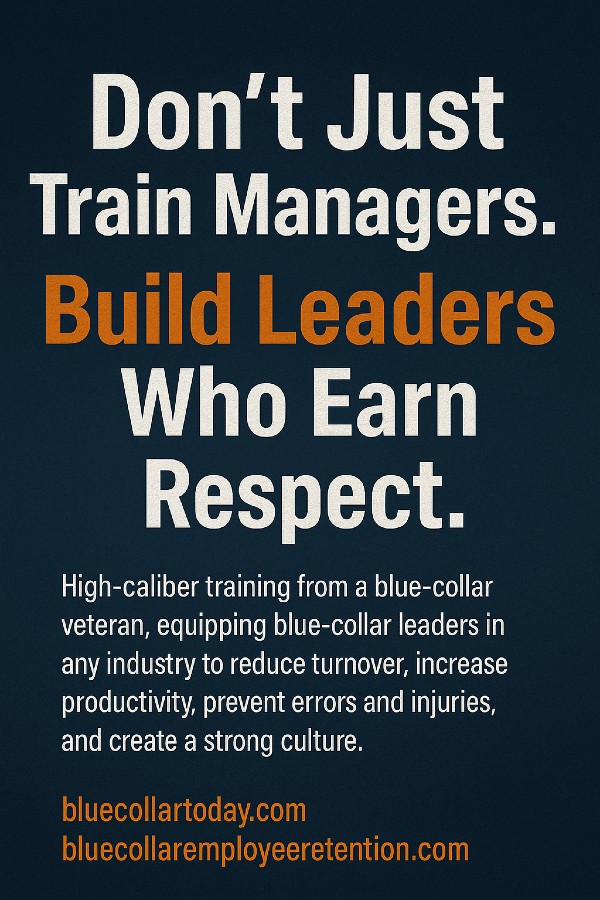
Why Younger Blue-Collar GMs Need an Experienced Blue-Collar Coach to Make Wise Decisions
In today’s fast-paced industrial environment, blue-collar businesses are under increasing pressure to deliver consistent results in a market that’s becoming more complex, competitive, and tech-driven. Many companies, in response to succession planning and workforce aging, are promoting younger general managers (GMs) into leadership roles. These individuals often bring fresh perspectives, energy, and technological fluency. But while youthful ambition is valuable, it's not a substitute for the hard-won wisdom that only comes with years of hands-on experience. That’s where the importance of an experienced blue-collar coach becomes not only helpful—but essential.
1. The Depth of Experience Can't Be Googled
There are no shortcuts to knowing what it feels like to make decisions with the livelihoods of dozens—or hundreds—of workers depending on you. Experienced blue-collar coaches have seen the cycles: economic downturns, equipment failures, supply chain disruptions, union negotiations, and leadership missteps that nearly sank companies. That kind of knowledge can’t be learned overnight. A coach with that history can help a younger GM anticipate challenges before they arise, make strategic choices based on precedent, and avoid costly misjudgments.
2. Bridging the “Book vs. Floor” Gap
Younger GMs often enter their roles with formal education or lean training, and while those tools are valuable, they don’t always align with the unpredictable, gritty nature of a shop floor. A seasoned coach can help translate book knowledge into shop-floor application. They know when to bend the rulebook, when to stick to it, and how to adapt best practices to real-world conditions. Most importantly, they can teach young leaders how to listen—to machines, to workers, and to the unwritten rules that define blue-collar culture.
3. Confidence Without Arrogance
A coach doesn't just prevent mistakes—they help instill confidence. For many young GMs, especially those promoted from within, imposter syndrome is real. Others may fall into the opposite trap: overconfidence without the humility that experience brings. A great coach provides honest, constructive feedback, offering perspective that builds strength while keeping ego in check. That balance leads to more respectful leadership and better decision-making.
4. Preserving Tribal Knowledge
Blue-collar industries often operate on unwritten standards and processes—what’s commonly called "tribal knowledge." An experienced coach knows where that knowledge lives and can help pass it on. If younger leaders step into roles without understanding the history and evolution of their operations, they risk making changes that backfire. Coaching ensures continuity while leaving room for innovation, helping younger GMs modernize wisely rather than recklessly.
5. People Management: It’s More Art Than Science
While spreadsheets, KPIs, and performance dashboards can measure some metrics, people management remains deeply nuanced. A seasoned coach understands how to lead across generations, how to deescalate heated confrontations, and how to earn respect from grizzled veterans. They’ve likely dealt with everything from workforce burnout to behavioral issues to morale-killing management trends. By helping younger GMs build emotional intelligence and communication skills, coaches enable long-term leadership success.
6. Decision-Making Under Pressure
Every GM eventually faces high-stakes moments: safety incidents, angry customers, overtime mandates, or sudden labor shortages. Making decisions under stress is a learned skill. Coaches provide not just perspective, but proven frameworks and mental models for how to approach tough calls. They teach when to push forward, when to wait, and when to get creative. A mentor who’s been there before is a priceless asset when the pressure mounts.
7. Building Long-Term Thinking in a Short-Term World
Younger GMs are often rewarded for short-term wins: hitting monthly production targets, trimming costs, or solving today’s crisis. But without long-term vision, businesses suffer. Coaches help younger leaders think bigger. They encourage legacy thinking: How will this decision impact our people in five years? What values are we building into the company? How can we grow without sacrificing our culture?
8. Filling the Void Left by Retiring Leaders
As older workers retire, the safety net of informal mentorship and leadership memory disappears. Coaching fills that void. It creates a structured environment where younger GMs can ask questions, get feedback, and reflect on their choices in a way that’s rare in the daily rush of operations.
Final Thought: Coaching Isn’t a Crutch—It’s a Competitive Advantage
In blue-collar industries, trust is earned through sweat, consistency, and wisdom. Young GMs have incredible potential—but they don't need to reinvent the wheel or learn every lesson the hard way. An experienced blue-collar coach is not a sign of weakness—it's the smartest asset a rising leader can have. Businesses that pair their next generation of leaders with mentors who’ve lived the grind, led through adversity, and built respect the hard way will gain a powerful advantage: continuity without stagnation, innovation without chaos, and leadership built on both muscle and mind.
In the world of blue-collar management, experience isn’t just valuable—it’s indispensable.





